Who Got You Through?

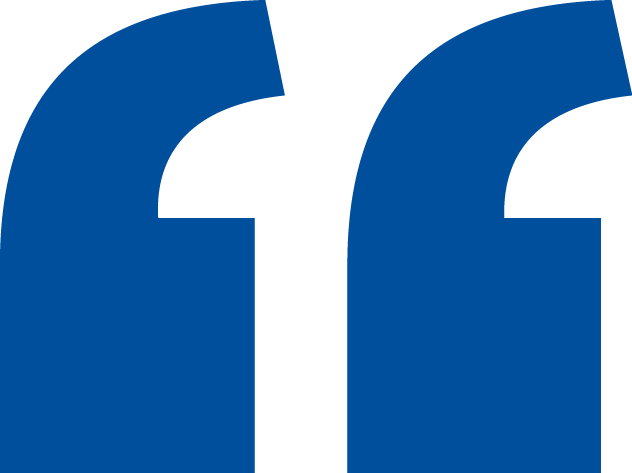
I wrote to both of them when my book was published.”
A West Point professor says two of his UNH poli-sci professors were his inspirational role models and the reason he followed in their footsteps into teaching. Two other graduates recall a lifelong friendship with a staff member who mentored them for their student jobs. Another alum recalls the several mentors he had at various times as a student, including both professors and the new friends he made.
Today, meaningful mentors are the reason that thousands of alumni volunteer here or support the university by making financial gifts in honor of the important role a UNH mentor played in their lives. And still others recall the lessons their mentors taught them and pay it forward every day by teaching those same lessons to others.
A mentor is universally defined as a person who provides guidance, who sparks new passions and supports our dreams; a person who perhaps gives us tough love when we are going astray, but then leads rousing cheers when we do something right. Many alumni say it was a mentor who helped get them through not just college, but also their first job and subsequent life milestones to come.
With that in mind, UNH Magazine asked a simple question: “Who was your UNH mentor — who got you through?”
And for those who answered our call and shared their stories — regardless of age, major, life path or location — the question evoked recollections of the generous ways that a mentor has helped them and, in many cases, created the foundation for a life of meaning and success.
Luckily, my freshman English class was taught by Lewis Goffe, who held the then-basic rank of instructor, and who modeled his writing instruction on the “conference” method of the eminent Professor Carroll Towle. One day I went to Mr. Goffe’s office to find it empty, and as I left, I met him in the hall with my latest composition in his hand. He’d gone to the Registrar’s Office to check me out, and he speculated that I might be happier in liberal arts. He was right; he set me on a course I’m still following, 70-odd years later.”
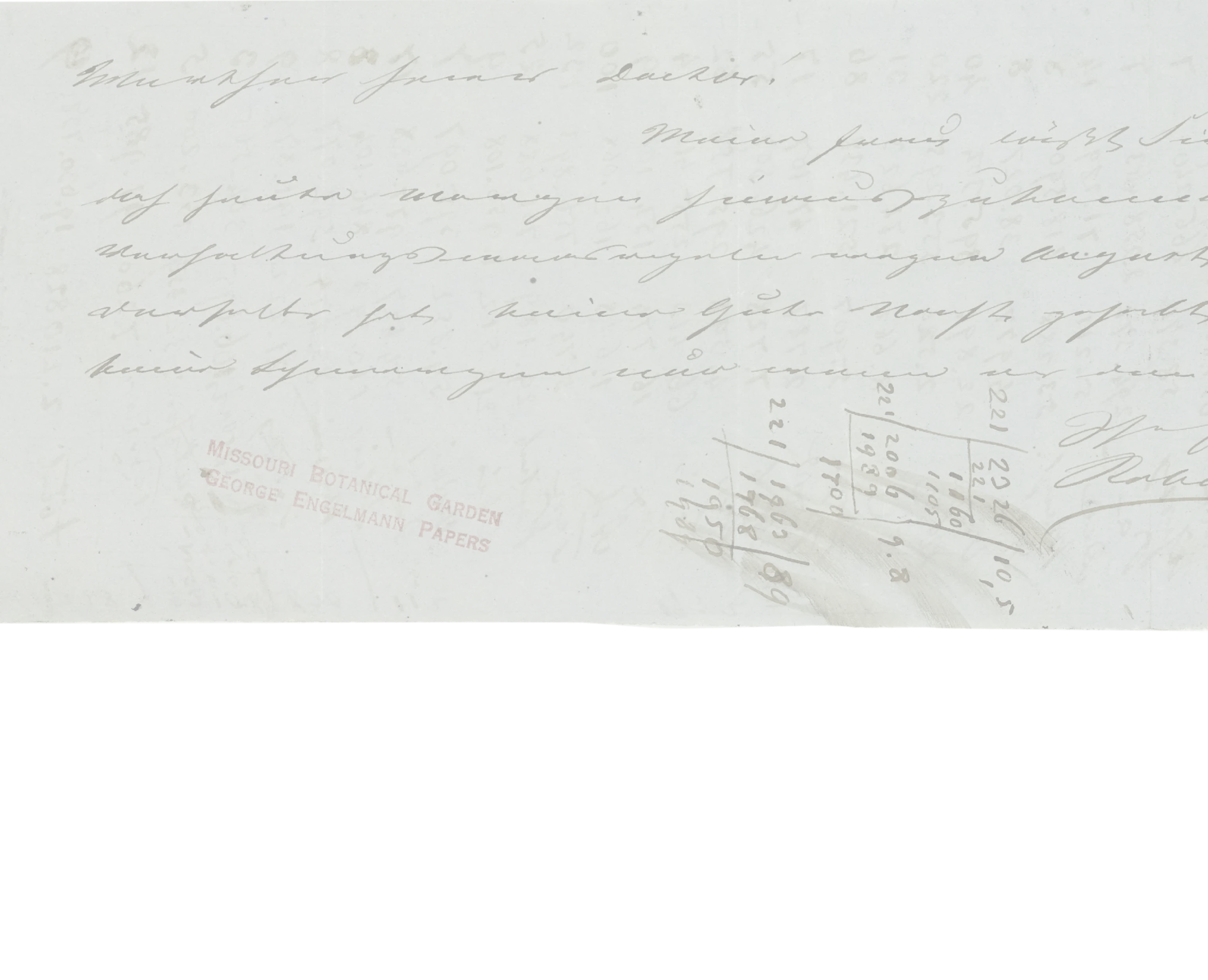
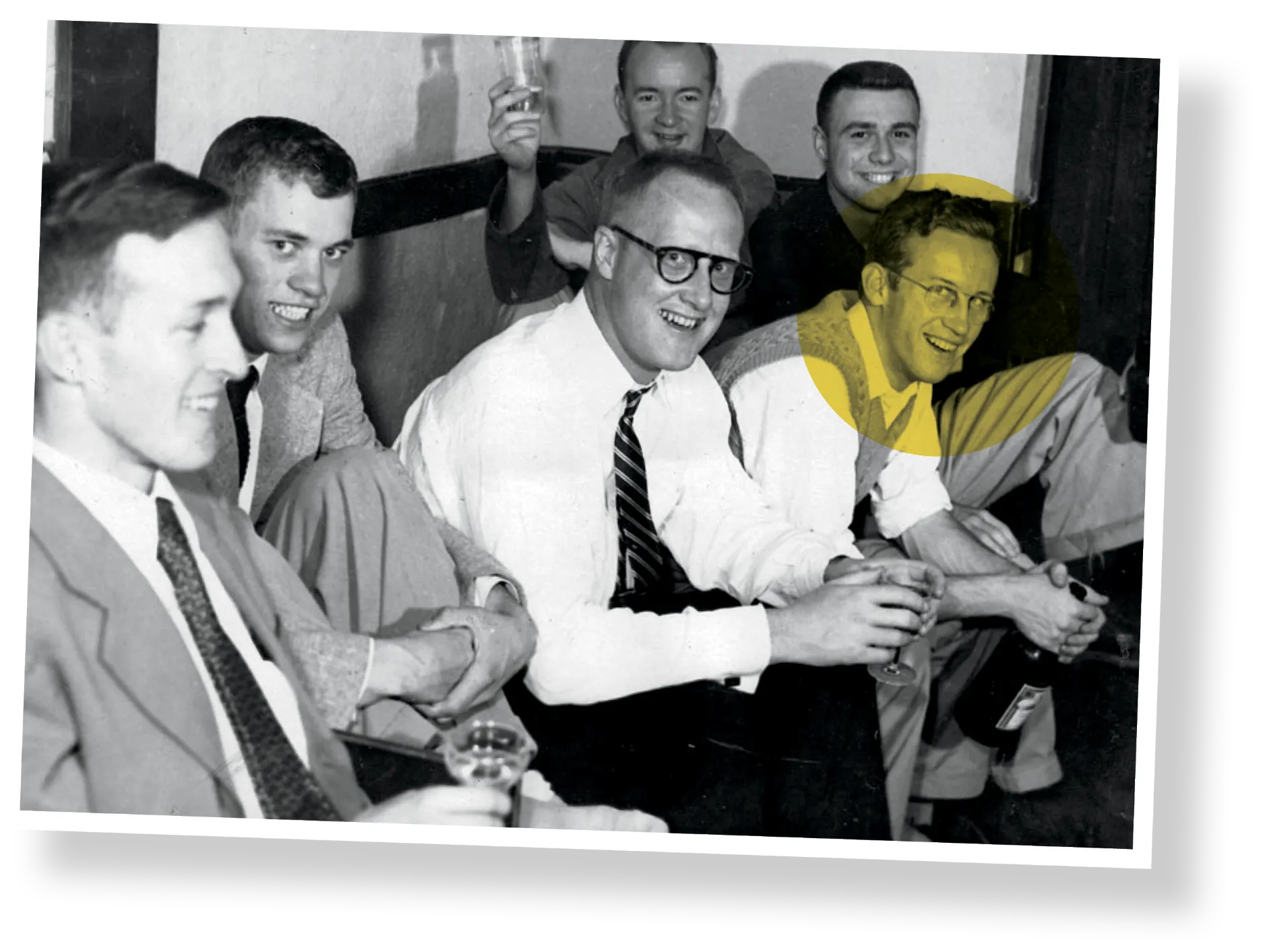
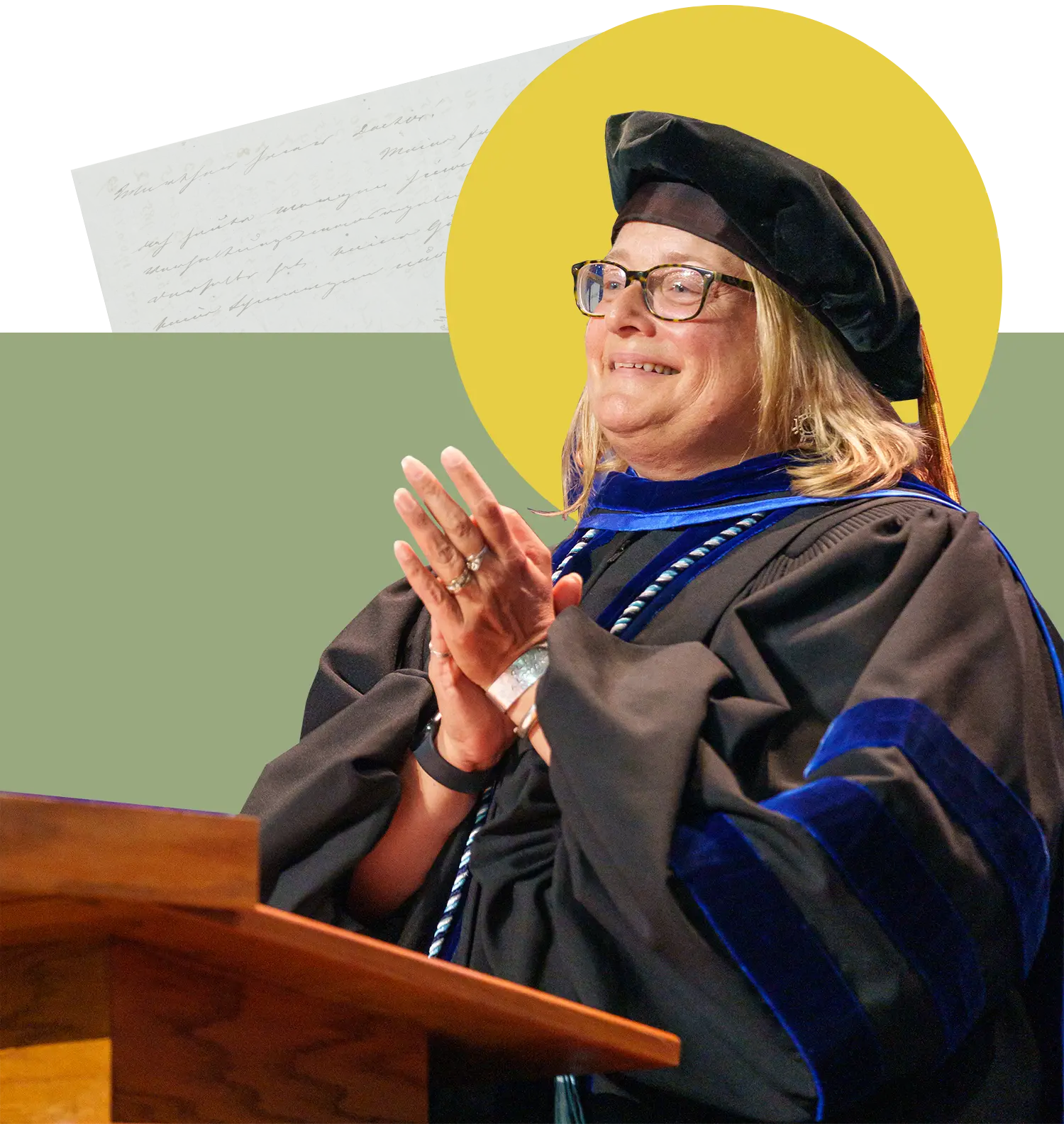
Ruth Varner, 2022 Award for Graduate Faculty Mentor, CEPS
The professor of Earth sciences has also mentored more than 55 undergraduate students participating in Research Experience for Undergraduates projects that she has led. Many of these students continue to graduate school, and their REU experience is often a key motivator.
Varner provides her graduate mentees with opportunities, training, guidance and professional development that prepares them for rewarding careers.
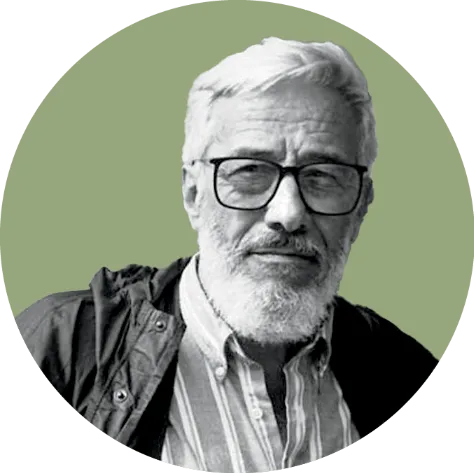
Many years later I was the local Scoutmaster. There were a few Life Scouts during my tenure, poised to earn the Eagle Award, but they were losing interest. Sports, cars and/or girlfriends started becoming more interesting. I pulled them aside and gave them the LeBlanc spiel. I said, ‘You’ll lose interest in sports, junk your old jalopy and either dump or get dumped by your girlfriend.’
Some took the advice and some, like me in 1964, didn’t.
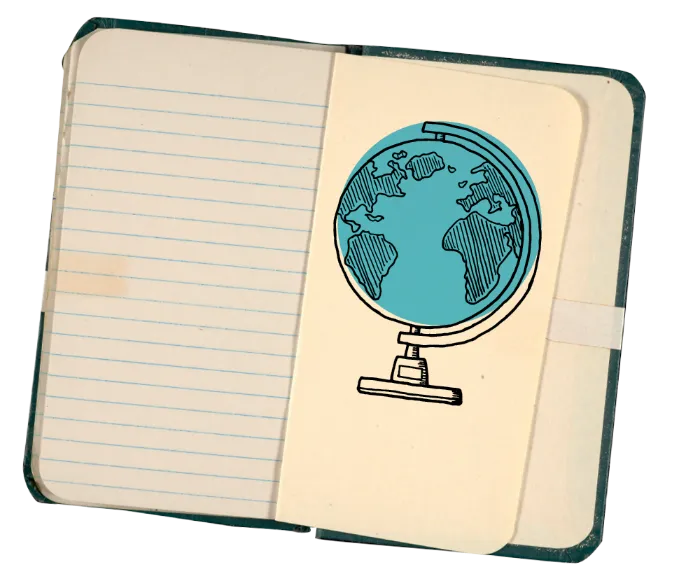
Robert LeBlanc was on United Flight 157 when terrorists crashed it into the World Trade Center. He was among the UNH professors who, by the way they taught, taught me how to be an effective teacher.”
Honoring Their Mentors

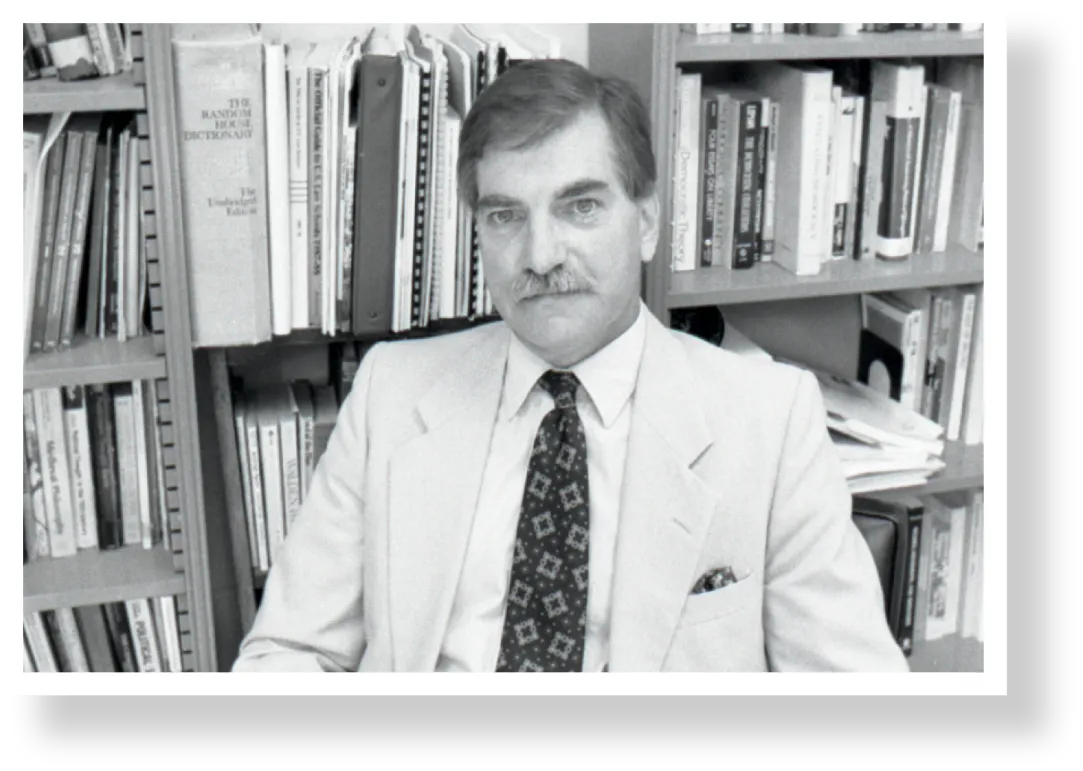
Without professors Kayser and Larson as inspirational role models, it is impossible for me to imagine that I would have pursued the professional life that I have for nearly 40 years, becoming a professor of political science myself, just to follow in their footsteps.”
Six years after graduating, I got the opportunity to embrace much of this support system again as I ended up taking a job as a social media producer at UNH Marketing and I’m living with my college best friend, Callie Ierardi ’17 ’18G, who also took a job at UNH Online.
My mentors and friends during my college years are a large part of the reason I get to be back at UNH today and I am incredibly grateful for that opportunity. ”

Teacher, mentor, stand-in grandpa?
Donald Hadwin, who has taught in the Mathematics Department since 1977, says the doctoral students he mentors often become family. And sometimes as a mentor, he becomes a real grandpa. That was the case with Weihua Li, who became a mother during her doctoral studies. She and her husband originally planned to send the baby back to China with her parents so she could finish her Ph.D., but Hadwin — father to a daughter himself — wouldn’t hear of it. After Li’s parents’ visit ended and they returned to China, Hadwin, a self-admitted night owl, lived with Li and her husband for a while to take overnight babysitting shifts, so Li could work on her thesis.
Li finished her doctoral program in 2009 and soon became a mathematics professor at Columbia College. She recently shared in a Columbia news article that when she sees her students struggling with some material, it reminds her of her own struggle with some subjects as both an undergrad and graduate student. Say Li: “I always try my best to help my students to do math to the best of their ability, as my professors and thesis advisors did for me.”

In my senior year, I registered for Chesbro’s course in Microbial Physiology where I found myself the only undergraduate among several students from graduate programs. On the first day of class, we were presented with the sole question that would constitute our final exam: “What is life?” We had the entire semester to contemplate the elements that could adequately address this fundamental of biology. For me, arriving at an answer proved to be the culmination of my academic growth at UNH.”
The loop of teaching and learning
They met when Clancy interned for Angelini at Timberland in 2019, staying in touch since then, with Angelini training her on regenerative agriculture, writing recommendation letters for her, and offering career guidance during the last four years.

SUPPORT FROM THE STABLES
“I started full time as a sales rep for Shires Equestrian, one of the largest equine distribution companies in the world a week before graduation. I wanted to mix my passion for horses with business and landed here! I have been riding horses since I was five years old and I went to an agricultural high school before coming to UNH, so I have been in the horse world for a long time. Horses are a huge part of my life and for a while I thought I wanted to ride professionally. Towards the end of my senior year, I applied to this company to work in the marketing department. (I wanted a job with concrete benefits to help pay off my student loans). I then got offered a sales representative position and took it! I have learned so much about the other side of the industry, I really do love it. Being able to travel and sell items that a year ago I was buying is such a cool experience!
“Overall, the UNH horses eased my college anxiety. Being away from home after growing up always around horses was not easy, so having these animals so close on campus allowed me to feel like I was home. I am so thankful for the UNH equine program. UNH will always have a special place in my heart, but home is where the horses are.”
Honoring Their Mentors
Professor Clark was quirky, eccentric, “the quintessential cat lady” — and made most freshmen who were required to take her art appreciation class crazy!
But Margot was also so very passionate and enthusiastic about her field; she hooked me with her zest for art. I had wanted to be a fine arts major when I transferred to UNH from Syracuse, but I didn’t pass the jury. I had business interests and artistic talent, which in those days didn’t leave a student with many choices. Margot took me under her wing; we went on many road trips to art museums around the Northeast. She taught me how to write a comprehensive art history thesis, which gained me entry into graduate school (I was told I was the first to be accepted into a graduate program from the UNH Art History Department).
In my 50s, I went on a group trip to Italy with some friends from my church. When we were in the Sistine Chapel, all looking up at the wonder, a fellow traveler next to me said, ‘Boy, this is just like Margot Clark said it would be!’ I couldn’t believe my ears! I smiled brightly to be sharing that experience with someone else who appreciated ‘the appreciation’ Margot Clark had instilled in me and who knows how many of us, traveling around the world, appreciating art!”
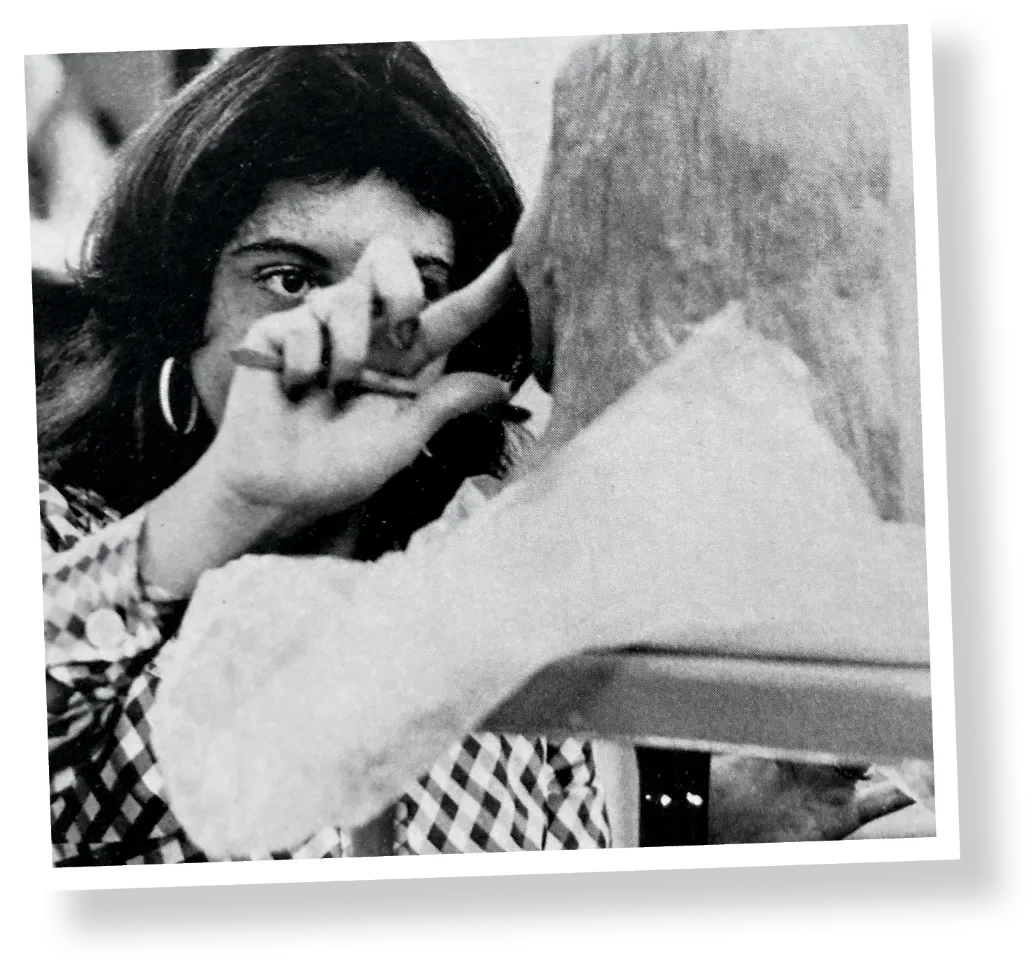

Showing CARE as a mentor
“I attribute my love of learning, my passion for mentoring others and my desire to constantly discuss new trends in the world of sport to Doc Collins, one of the strongest female role models I have had in my life,” one student wrote.
You might not get a more powerful compliment than that.
Collins, whose areas of expertise are coaching education, coaching philosophy and leadership development, has been teaching at UNH for 22 years. She was previously a collegiate coach at Dartmouth and Princeton, and at UNH.
“In my discipline, mentoring is embedded in coaching and, for me personally, in teaching,” Collins explains. “Those things always go hand in hand, whether with students or in my work in faculty development.”
In her decades of mentoring, Collins explains, she uses the acronym of CARE — Challenge mentees to consider different perspectives, Exhibit authenticity and Relatability in mentor-mentee relationships, and Empower mentees to learn to use their voice.
Collins’ own mentors are many, but she says she often finds herself saying things that University of Illinois Professor Dan Gould, her doctoral advisor and renowned sport psychology expert, would say. She also recounts former UNH faculty member Steve Hardy as a mentor, as well as many of the seasoned faculty members in the Kinesiology Department.
So how does she know when it’s working? In the moment, she says, and sometimes many years later. “You still get the little chills when you see a former student at an academic conference or coaching a team, and they reach out to you to ask advice about a challenge they’re running into or they share an article they think would be good in one of my classes,” she says. “It’s a reminder: That’s what keeps us in it; this is why we’re doing what we do.”
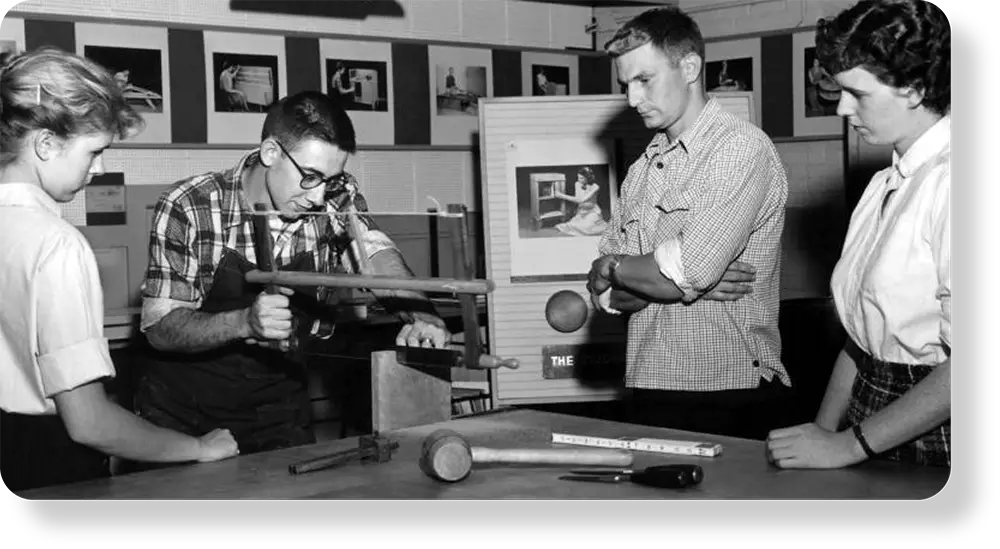
Support for UNH Museum of Art exhibit honors influential professor, artist
But according to friend and former student Doug Peters ’71, Valenza “hides his light under a bushel” — not fully acknowledging the significance of his own work, or his legacy in American contemporary art.
The UNH Alumni Relations team regularly brings current students with them for alumni events around the country — so that student can network with alumni, and so alumni in places like Florida, Colorado, California and other locales can hear directly from students what campus life is like these days.
That’s how Anthony and a handful of other students ended up in Florida in 2016, with members of the alumni team — happy to represent the university, but also happy to take a break from a New Hampshire winter for a few days.
And that’s where he met Harry Patten ’58, owner, chairman and founder of National Land Partners — which boasts billions of dollars of real estate sales.
And as simple as it sounds, the two just hit it off. “We got to talking about the Atkins Investment Group at Paul College that I was part of, and we just ended up having this really great conversation for a while.”
That great conversation lead to career success for Santosuosso, now married and living in Texas, and making a name for himself as a land consultant for National Land Partners.
“The most valuable thing I pulled out of UNH was the skill to network,” he says, noting that he employed those skills in his conversations with Patten, and other alumni and professional connections he’s made. “Every alum I’ve talked to has been more than willing to go above and beyond in giving advice in any way they can. And maybe they take a risk on someone simply based on their connection to the school, and what they see in that person. That’s how it was for me. It might just take one interaction to lead to a waterfall of good things for you.”
Professor Pokoski worked with me to combine my bachelor’s coursework with my master’s work so I could graduate early, and I later became his teaching assistant. He and Professor Hal Wochholz arranged for me and a couple of other students to work part-time at Northeast Electronics in Concord. At the time they did telephone test equipment. At Northeast I got exposed to the very first microcomputers and was asked to investigate them for Northeast use. With Professor Pokoski’s help we turned this into my master’s degree project. Professor Pokoski convinced me to contact Intel and explain our concept. Intel supplied components and only wanted a copy of my thesis in payment. The result was the first microprocessor development station that supported real-time debugging of microprocessor code. We were selected to present the work at an IEEE proceeding in Philadelphia.
After I graduated, Professor Pokoski asked me to help teach a microprocessor class with him and Professor Stuart Cady at New Hampshire Technical Institute. After that, I lost track of Professor Pokoski until he was asked to write something in the Electrical Engineering Ramblings newsletter on his retirement in 1994. I accidentally came across it and was surprised to see my name listed as one of the students he remembered. Since then we have reconnected, and l am privileged to call him one of my mentors.”
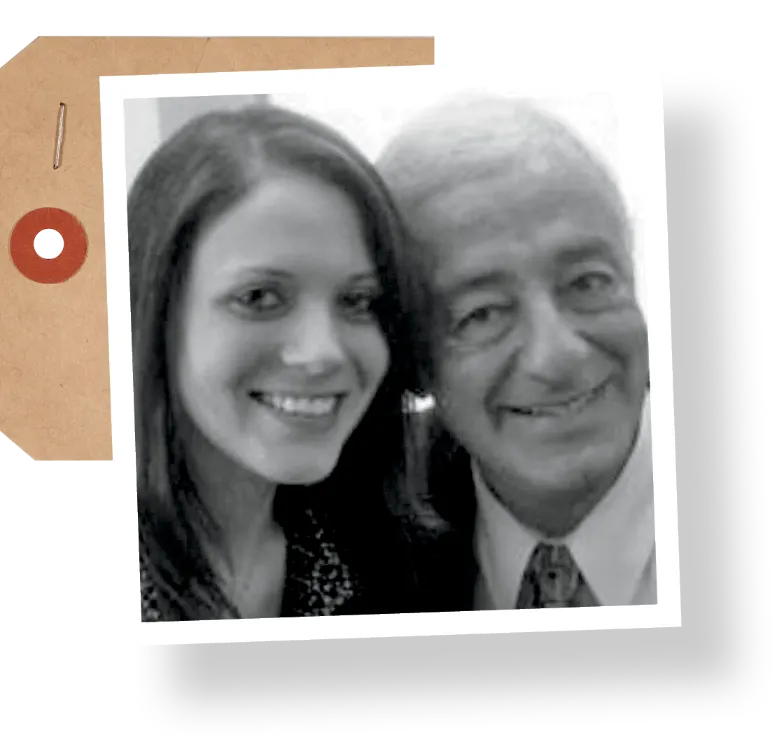 He approached life, and stress, from a place of joy, and he taught me to do the same. He had a knack for holding me to high expectations while also accepting me for exactly who I was. Chief Halias, who was police chief from 2000 to 2012, was a distinguished, well-educated law enforcement professional with a refreshing sense of humor. He was an integral part of my time at UNH and a wonderful pen pal up until his unfortunate passing in 2014. He reminded me to work hard for my accomplishments and brought me a fresh cookie from Holloway Commons after his lunch almost every day. He was such a kind soul, and I am where I am today because of his mentorship.”
He approached life, and stress, from a place of joy, and he taught me to do the same. He had a knack for holding me to high expectations while also accepting me for exactly who I was. Chief Halias, who was police chief from 2000 to 2012, was a distinguished, well-educated law enforcement professional with a refreshing sense of humor. He was an integral part of my time at UNH and a wonderful pen pal up until his unfortunate passing in 2014. He reminded me to work hard for my accomplishments and brought me a fresh cookie from Holloway Commons after his lunch almost every day. He was such a kind soul, and I am where I am today because of his mentorship.”
Honoring Their Mentors
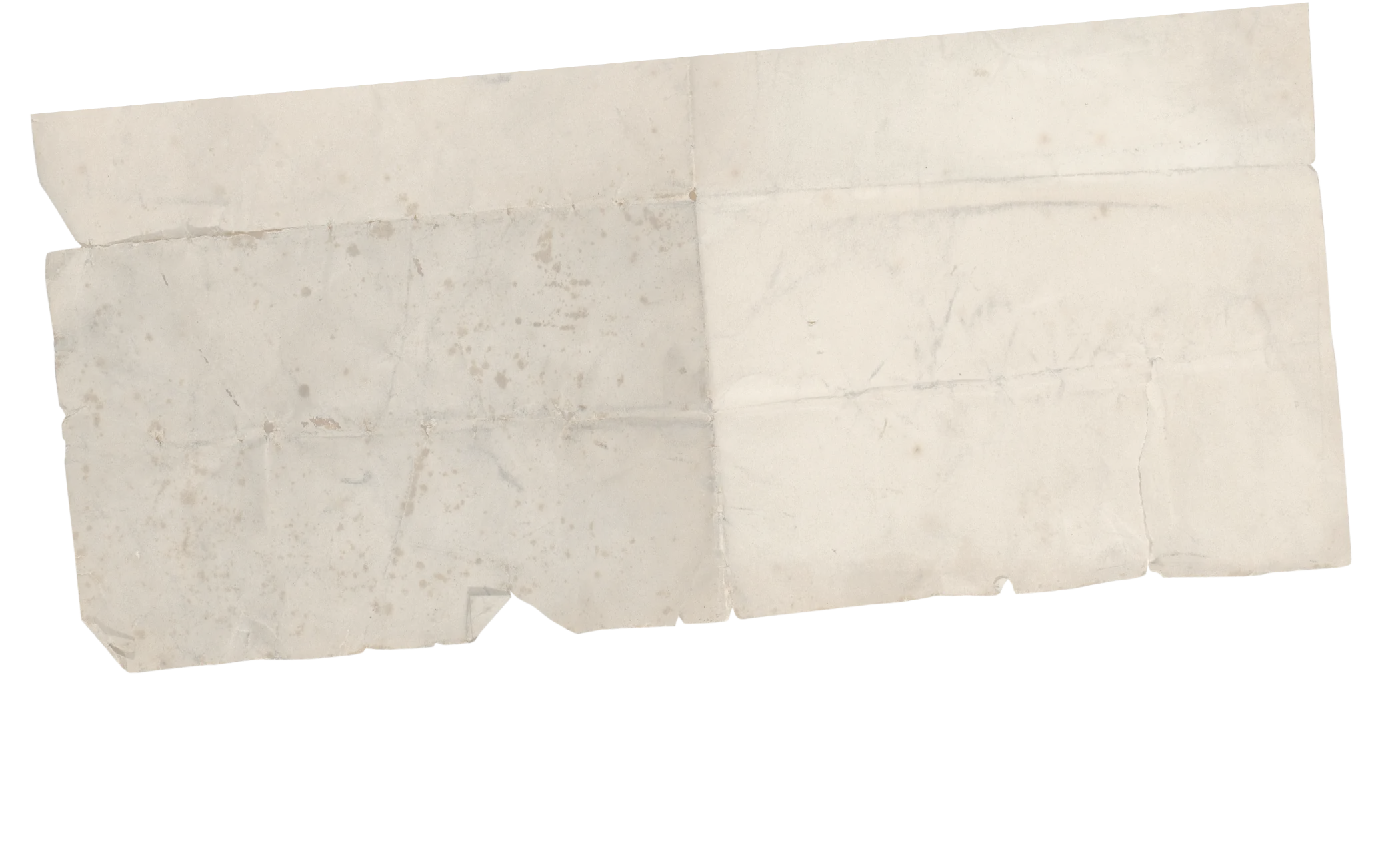

I currently work at Boston University and discovered that Toni was also a mentor to the mom of one of my co-workers, Abby Burmeister Styles ’15. One day when Abby and I were talking about UNH, we realized in our conversation that Abby’s mom, Cathy Burmeister ’84, and I both worked as part-time staff in Institutional Research.
In January 2021, I became the inaugural director of the Newbury Center at Boston University, which is a university-wide center that supports first-generation students. Toni was one of those mentors in my life who informed the work that I do today.”
Adds Cathy Burmeister ’84: “Even though I was only a part-time work-study student, Toni was helpful, interested in me as a person and always willing to lend an ear. My work-study job at UNH Institutional Research started my sophomore year at UNH in the fall of 1981. Anyone who knows Toni knows that she can be very inquisitive and also very direct with her thoughts and opinions. Additionally, she is very accepting of all people; I have known and been friends with her for 39 years.
Toni became someone who I could always count on as a mentor and a friend. Knowing Toni enriched my UNH experience and my life.”
ALGAL APPRECIATION
If you’re Peter Siver ’76G — or anyone who is equally well known in the field of phycology (the study of algae) — it makes perfect sense.
When one of his mentors, Alan Baker, retired from UNH after 47 years of teaching in 2019, Siver was on hand to celebrate and to formally let Baker know that he had named a new fossil species that he recently discovered for him: Mallomonas bakeri.
“It was an honor … to be able to name a new organism after Al Baker,” Siver said at the time. “It was also fitting since his knowledge of freshwater algae surpasses most other scientists worldwide. I wanted to be able to make the presentation in person and thank him for helping to instill in me a similar lifelong passion for the study of freshwaters.”
Baker and Siver’s relationship has its roots at SUNY Binghamton, where they both studied separately under phycologist George Schumacher. They worked together, at Schumacher’s suggestion, at Northern States Power Company in Minnesota, where Baker was finishing up graduate work, measuring the productivity of plankton upstream and downstream from the company’s new Prairie Island Nuclear Power Plant on the Mississippi River, and identifying the plankton species present.
Siver would go on to get his doctoral degree at Connecticut College, where he is now the Charles and Sarah P. Becker ’27 Professor of Botany and Environmental Studies. Earlier this year, Siver was elected to the Connecticut Academy of Science and Engineering, and recently received an award of excellence from the Phycological Society of America for his lifelong work.
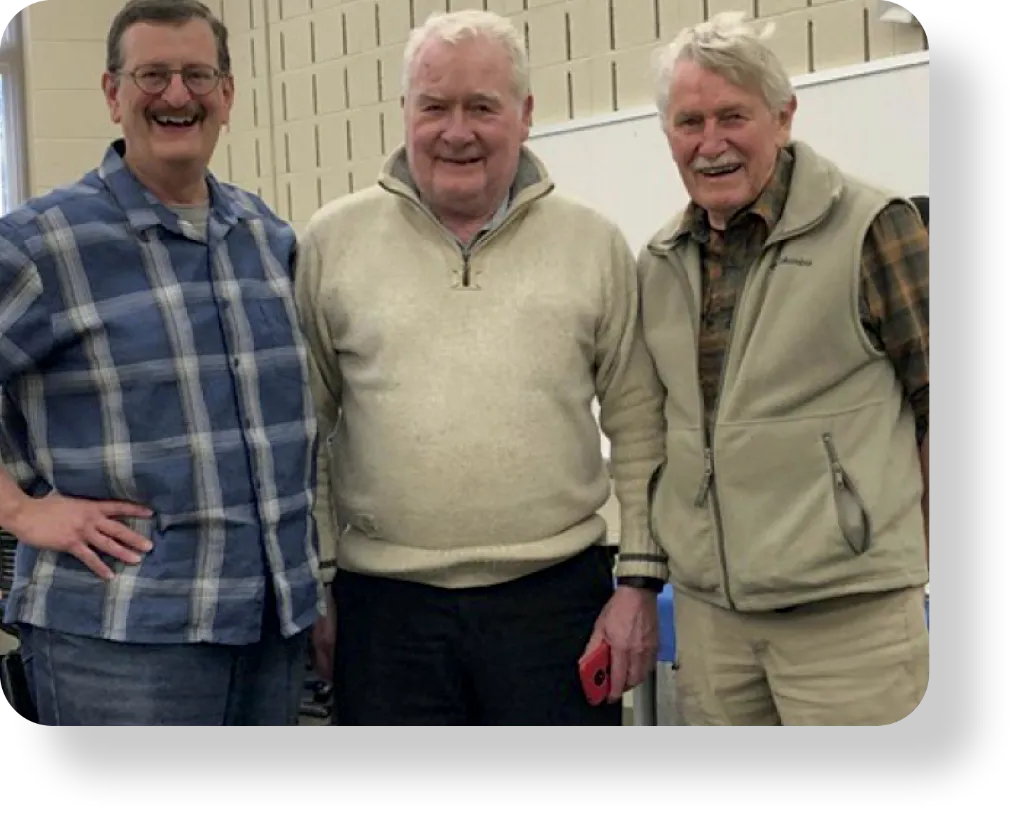
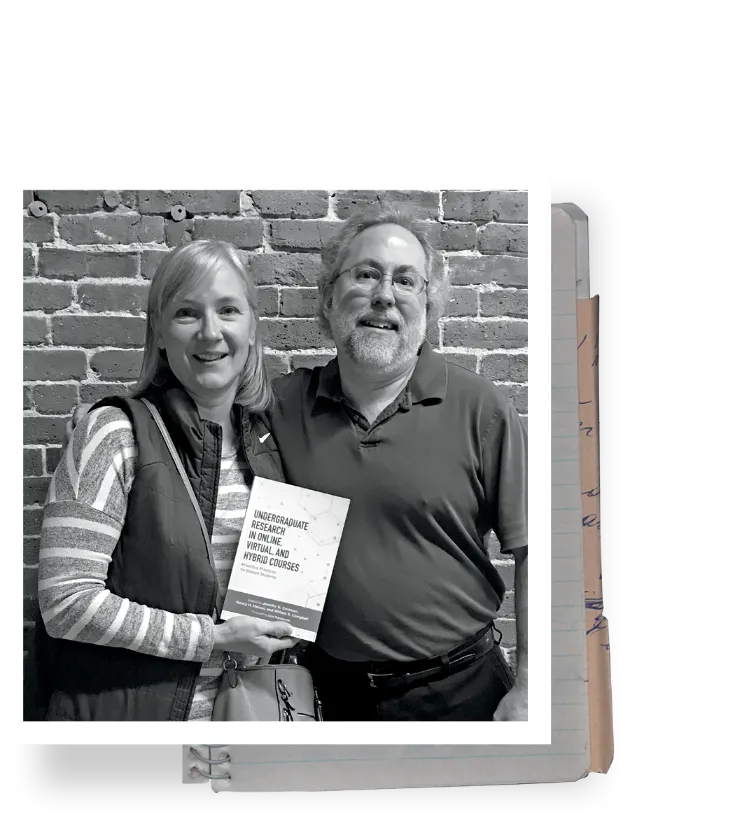
Knowing that I wanted to pursue a Ph.D., a friend’s parents, both professors themselves, recommended that I get involved in research under a faculty mentor. They told me to consider the professors I most enjoyed in class, and to inquire if they had active research projects. I approached Dr. Sparrow the following week. He gave me a tour of his vision lab and immediately made me feel welcome. I didn’t honestly know what Professor Sparrow studied; I just knew his cognition course was among my very favorites. Sometimes things fall into place — perfect timing, fascinating topic and the good fortune of finding a great mentor.
During the two years that I worked with Professor Sparrow, I learned how to read highly technical articles, conduct scholarship in the field, write about our research, collaborate as part of a team. I also presented at two conferences. When I was applying to graduate programs, he suggested I take a look at UNH. He applied absolutely no pressure, but he knew my goal of becoming a college professor was well aligned with the doctoral program at UNH. I got in and turned down other offers because he was right — UNH was a great fit for me.
Every undergraduate student with whom I have worked since 1988 has been impacted in some way by my experiences with Dr. Sparrow. When I reflect on key foundational experiences I had, his mentoring is at the forefront. Currently, more students are participating in higher education because of the opportunities created by online offerings. As I work with online students who are remote, I am determined to provide them with undergraduate research opportunities just like I was afforded.
I recently had a chance to see Dr. Sparrow at his office at UNH Manchester. I thanked him in person; I love being able to pay tribute to a treasure at UNH Manchester.”

From challenges, lessons learned
The resilience he learned carried him through a long career of teaching and coaching, where mentors advised him and taught him the life lessons he needed to know.
As a coach and mentor to young players in his own right, he says, his advice now is the same as it was when he was coaching: “Keep at it, don’t quit, and keep working. You’ll always be winning or losing, but you need to keep getting back into the game.”
CAMPUS MENTORSHIP PROGRAMS
In 1994, the CONNECT Program at UNH was launched, built on a foundation of mentorship. CONNECT, or Challenging Ourselves in a New and Nurturing Environment by Coming Together, is designed to help students who have been historically excluded from higher education (people of color, first-generation students and/or those with high financial need) thrive at UNH.
As first-year students, CONNECT participants are matched with a peer mentor who works throughout the mentee’s first year to support their academic, personal and professional goals.
“What we know about student development is that there’s a power in seeing people who have walked a mile in your shoes,” says Funmi Oyekunle ’12, CONNECT coordinator. “CONNECT mentees know that their mentors understand their journey, even if they might not have a similar culture or background. It’s about seeing someone across the quad and thinking, ‘I see someone there who knows who I am and they celebrate who I am; I’m not just a tokenized student here.’”
Peer mentors serve as guides to navigate the freshman experience — from academics to fostering a sense of belonging, helping new students find their voices and creating a feeling of community so that new students can get the most out of their college experience.
Those mentor connections last well beyond freshman year.
“Our tagline is ‘once connected, always connected’ — it’s really a testament to our current students and our alumni who are always reaching out to us, and looking to pay it forward by helping a younger generation,” says Oyekunle.
Her work with CONNECT is a real “full-circle” moment: she counts Roger Beattie, co-founder of the CONNECT Program, as one of her most treasured mentors from her own undergraduate years at UNH.
Oyekunle met him during her freshman year “when I was a student in the nursing program with zero passion for nursing.”
Beattie noticed.

“Because he called that out, I ended up meeting with him more than once a month during my first year and my sophomore year at UNH. I sought his guidance and advice for everything,” Oyekunle says.
Beattie’s advice to Oyekunle rings true for today’s students — especially one particular nugget of wisdom: “He told us that from the first day of class, make sure you sit in front. Make sure your professors know who you are. Make yourself seen.”
For Vituu Touch ’23, coming into the program as “a little freshman trying to figure things out” informed how he saw his own mentee when he became a CONNECT mentor.
“It’s about being in someone else’s shoes, because I’ve been through some things they’ve been through, but it’s about trying to understand their perspective,” he says.
The mentoring skills he applied in CONNECT extended to other leadership positions he held on campus during his four years, including serving as chair of the United Asian Coalition, a resident assistant and an orientation leader, a chemistry representative on the College of Engineering and Physical Sciences student advisory board. He also played a part in helping others revive the Japanese Student Association.
“Fostering a safe and welcoming community, just like people in my position have done in the past, is something I always hoped to do, and just hope to keep doing it.”
Touch, who graduated with a degree in chemistry and plans to go to medical school, recalls his own mentor, David Suoth ’22, who was chair of the UAC when Vituu was a freshman. “My sophomore year he gave me a 15-page guide” about running a student organization. “Most of what I’ve done is just because I watched him. When I won student leader of the year last year, the first person I texted was David.”
In the College of Health and Human Services, ACE mentors are upper class students who help incoming first-year students adjust to life at UNH and CHHS. These peer mentors serve as a resource, friend and guide, and also co-facilitate first-year seminars and continue to connect with their mentees throughout the year.
The ACE Program (Academic and Career Engagement) combines that mentorship with two other key elements: professional academic advising and a seminar series where first-year students explore CHHS majors, as well as topics like study abroad, diversity and inclusion and campus resources.
The program was launched in 2017 by Mary Beth Carstens, advising and academic success director for CHHS. She believes first-year programs like ACE, especially those that have a mentoring component, are vital in today’s higher ed landscape.
“First-year experience programs are all about student success,” she says. “We’re putting a structure in place for students to be able to thrive — here at UNH and in whatever career path they may choose.”
In many instances, mentoring often morphs into professional networking with positive results. That’s true for the alumni and students who take part in the Wildcat Connection alumni network, a partnership between UNH Alumni Relations and UNH Careers and Professional Success.
Just ask Deborah Overdeput ’82 who is an active alumni mentor through the program.
“I like the connection to the school and meeting these smart students; connecting with them really keeps me ‘young-minded’ and that’s valuable to me. These are interesting people I probably wouldn’t have met otherwise,” she says.
Wildcat Connections was launched with a dual goal: allowing students to benefit from the rich experiences of alumni like Deborah, while giving alumni the chance to give back in a meaningful way to their alma mater by helping fellow Wildcats succeed.
Overdeput points out the mentorship program is about much more than just landing a job: It’s a way for these students to learn professional skills they’ll use throughout their careers. “Being a hiring manager in different organizations, I know what kind of conversations need to happen between a leader and an employee,” she said.
Overdeput shared that the idea of mentoring came to her late in her career. She was working in the financial services industry in 2008 when the market collapsed, the Great Recession set in and she — like so many others at that time — lost her job.
“A mentor helped me think through a lot of things at that time. I also connected with a bunch of people who helped me, as well.” She realized that as she figured out how to move her life forward, mentors were providing valuable advice and feedback.
She says successful mentoring is a lot about listening rather than telling. “I never tell my mentees what to do. I listen, build trust and offer guidance. It’s a professional relationship that is mutually beneficial.”
Stephanie Whitney, career director in the College of Engineering and Physical Sciences (CEPS) echoes the idea that mentorship programs abound at UNH, and that they’ve taken on new importance as college students benefit from even more support and guidance since the 2020 start of the COVID-19 pandemic.
Ironically, that was around the time when CEPS conceived its mentorship program, CEPSMentorSHIP; the “SHIP” acronym stands for Students Harnessing Industry Perspectives. Career mentorship is the key to the program, which allows for sophomores, juniors and seniors to explore their areas of professional interests in conversations with industry professionals.
This spring, Whitney said, the third cohort just completed the program, with about three dozen students taking part. She says 95 percent of the industry professionals are also UNH alumni.
“We know that alumni want to be part of UNH student successes. The core of our model is building relationships,” she explains.
She says the mentors who get the most of these one-on-one relationships are those “willing to meet students where they are in their career journey. Some students have a very clear picture of what they want to do, while others have no idea,” says Whitney.
“It’s great to see that moment when students are paired with an adult with whom they are freely exploring topics and career trajectories,” she says. “We’ve heard from several matched pairs that they continue to stay connected long after the program ends.”

The support of my parents for many years and my own persistence “got me through.”
I have composed more than 50 works for band, chorus, orchestra and soloist, many of which I have performed with my elementary band students, and all are unpublished. I sang with my church choir for more than 30 years. Now retired, music got and still “gets me through.” I have also published a book of poetry. Finding a way to create “gets me through.”
My wife Donna and I recently celebrated our 41st wedding anniversary, and we have two wonderful, accomplished adult daughters. They “get me through.” At this age, the promise of each new day and whatever it brings “gets me through.”
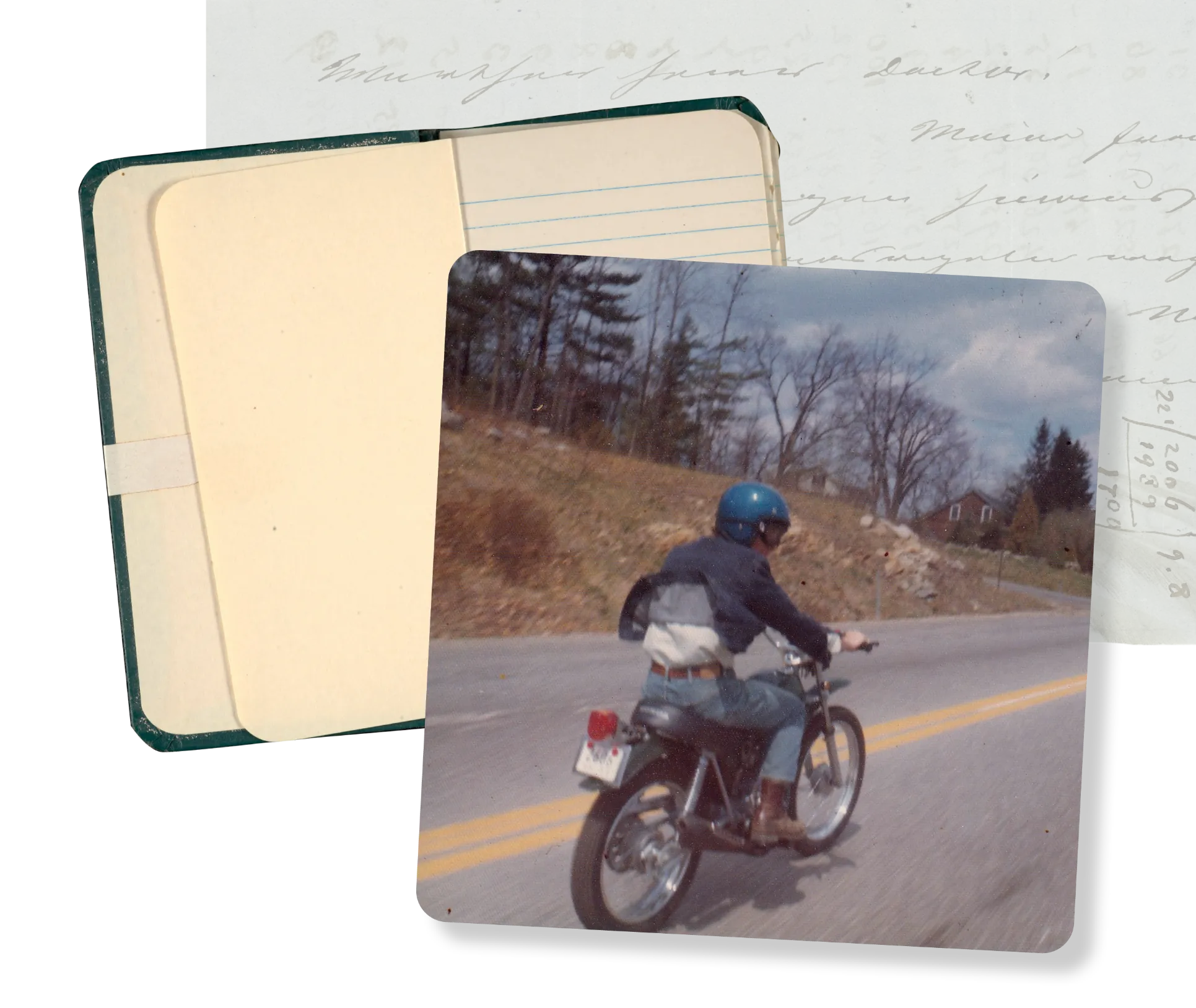
Final exam help
He injured his hand severely in the accident — a problem for a young college student about to take finals (remember, this was back before personal computers, so exams were handwritten … tough to do if the hand you write with is smashed up).
“I went into Professor David Limbert’s office and said, ‘What am I going to do? I can’t hold a pencil!’” recalls Damiano, who was a mechanical engineering major.
So, as any good mentor would do, Limbert gave guidance to young Paul — by bandaging his hand and taping a piece of chalk in the wadded-up mess.
“The chalk came out where my pinky finger would, and he gave me the final exam in his office on the chalkboard instead of on a piece of paper.” Limbert left the room as Damiano wrote out the answers, coming back in only to check each question.
Damiano got one of the best grades on the exam. “For me it was really heartwarming; I couldn’t thank him enough,” says Damiano. “That got me through, that was the last final exam for me, and I was able to graduate in January 1974.”
The chalkboard final was like a milestone in a long mentorship that began during Damiano’s undergraduate career and continues to this day.
“I’m pleased to know we still know each other and appreciate each other,” Damiano says.
Paul and Janet later married and had three daughters, all Wildcats: Cara ’99, Gina ’02 and Lisa ’07 ’09G. “I couldn’t be prouder of my brood of kids; we raised motivated young ladies full of accomplishments. Your children learn by watching and listening and seeing how you live your lives. In a way, parenting is the ultimate mentoring.”
Damiano worked for decades at Kaman Industrial Technologies, retiring in 2011 as vice president of marketing. Limbert’s lessons never left him no matter what his role at the company. “As my career progressed, I tried to act like a mentor to many people who worked for me. David taught me how to do that.”
Honoring Their Mentors
Honoring Their Mentors
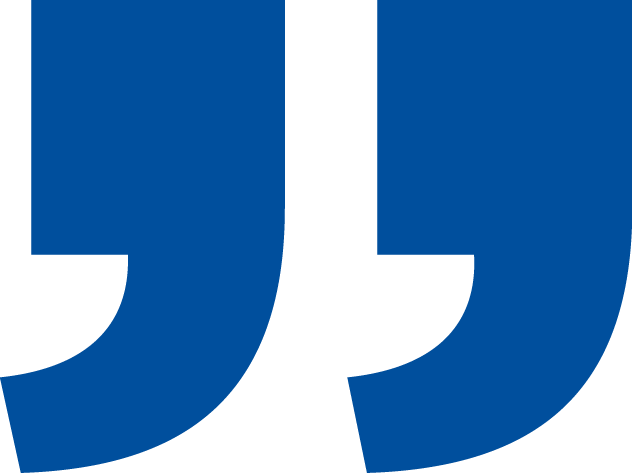
Keep the memories coming
If these stories inspire you to recall your own UNH mentor, please share your story with your fellow readers. Email alumni.editor@unh.edu or mail your story to: Editor-in-Chief Michelle Morrissey, 9 Edgewood Road, Durham, NH 03824, and we may feature it in a future issue.

In my senior year, I registered for Chesbro’s course in Microbial Physiology where I found myself the only undergraduate among several students from graduate programs. On the first day of class, we were presented with the sole question that would constitute our final exam: “What is life?” We had the entire semester to contemplate the elements that could adequately address this fundamental of biology. For me, arriving at an answer proved to be the culmination of my academic growth at UNH.”
When I sought Dr. Chesbro’s help with choosing a graduate program, I was pleased that one of the three schools I was considering was also among his three recommendations. That was Rutgers University, and specifically its Waksman Institute of Microbiology. I applied, was accepted, and offered training-grant support in the laboratory of Dr. J.O. Lampen. Once I had accepted the offer, Dr. Chesbro surprised me with the announcement that he would be going on sabbatical that fall, a sabbatical to be spent in Prof. Lampen’s lab! My college mentor had guided me to a laboratory where he knew the approach to science would resonate well with me.
My doctorate from that laboratory, in turn, positioned me for a career in the pharmaceutical industry where I participated in the development of an antibiotic that treats immunocompromised patients with systemic life-threatening fungal infections.
I shall be ever grateful for my UNH faculty advisor for setting me on the road that led through my fulfilling career.

SUPPORT FROM THE STABLES
“I started full time as a sales rep for Shires Equestrian, one of the largest equine distribution companies in the world a week before graduation. I wanted to mix my passion for horses with business and landed here! I have been riding horses since I was five years old and I went to an agricultural high school before coming to UNH, so I have been in the horse world for a long time. Horses are a huge part of my life and for a while I thought I wanted to ride professionally. Towards the end of my senior year, I applied to this company to work in the marketing department. (I wanted a job with concrete benefits to help pay off my student loans). I then got offered a sales representative position and took it! I have learned so much about the other side of the industry, I really do love it. Being able to travel and sell items that a year ago I was buying is such a cool experience!
“Overall, the UNH horses eased my college anxiety. Being away from home after growing up always around horses was not easy, so having these animals so close on campus allowed me to feel like I was home. I am so thankful for the UNH equine program. UNH will always have a special place in my heart, but home is where the horses are.”

From challenges, lessons learned
But before the season started, Dennen would be released, and his dreams of playing pro ball seemed to be over almost as quickly as they came true.
“At the time when you’re young like that, you put a lot of emphasis on the sport … the glory the whole thing, it means a lot to you,” Dennen says, recalling the tryout more than six decades later. “You put a lot of emotion into it and then all of a sudden you’re released, and it’s no fun.”
But growing up playing the sport taught Dennen a thing or two about resilience.
“Being released late by the Patriots was a real kick in the gut. But playing football enhances your ability to take a hit and come back stronger,” he says.
So a career in the game he loved was still in store for Dennen, who grew up playing for the Gloucester High School Fishermen, and played at University of Connecticut before joining the Wildcats on the gridiron in Durham, where he was an all-conference player for the Wildcats before injuring his knee during this senior year.
He would go on to play for the Providence Steamrollers of the ACFL, earn a master’s degree in education, coach high school football in Massachusetts and Connecticut for many years, and teach and coach at University of Rhode Island.
Dennen, now retired and living in Florida, recently shared a biography of sorts that he’s been working on — detailing his upbringing in the sometimes rough seaside city of Gloucester, playing Fishermen football, his time at UNH, and his teaching and coaching career.
Much of it focuses on the influential mentors he encountered who made a difference in his life — including coaches in Gloucester and in the ACFL.
As a coach and mentor to young players in his own right, he says, his advice then was the same as it is now: “Keep at it, don’t quit, and keep working. You’ll always be winning or losing, but you need to keep getting back into the game.”
Full Circle with CONNECT Program
As first-year students, CONNECT participants are matched with a peer mentor who works throughout the mentee’s first year to support their academic, personal and professional goals.
“What we know about student development is that there’s a power in seeing people who have walked a mile in your shoes,” says Funmi Oyekunle ’12, CONNECT coordinator. “CONNECT mentees know that their mentors understand their journey, even if they might not have a similar culture or background. It’s about seeing someone across the quad and thinking, ‘I see someone there who knows who I am and they celebrate who I am; I’m not just a tokenized student here.’”
Peer mentors serve as guides to navigate the freshman experience — from academics to fostering a sense of belonging, helping new students find their voices and creating a feeling of community so that new students can get the most out of their college experience.
Those mentor connections last well beyond freshman year.
“Our tagline is ‘once connected, always connected’ — it’s really a testament to our current students and our alumni who are always reaching out to us, and looking to pay it forward by helping a younger generation,” says Oyekunle.
Her work with CONNECT is a real “full-circle” moment: she counts Roger Beattie, co-founder of the CONNECT Program, as one of her most treasured mentors from her own undergraduate years at UNH.
Oyekunle met him during her freshman year “when I was a student in the nursing program with zero passion for nursing.”
Beattie noticed.

“Because he called that out, I ended up meeting with him more than once a month during my first year and my sophomore year at UNH. I sought his guidance and advice for everything,” Oyekunle says.
Beattie’s advice to Oyekunle rings true for today’s students — especially one particular nugget of wisdom: “He told us that from the first day of class, make sure you sit in front. Make sure your professors know who you are. Make yourself seen.”
For Vituu Touch ’23, coming into the program as “a little freshman trying to figure things out” informed how he saw his own mentee when he became a CONNECT mentor.
“It’s about being in someone else’s shoes, because I’ve been through some things they’ve been through, but it’s about trying to understand their perspective,” he says.
The mentoring skills he applied in CONNECT extended to other leadership positions he held on campus during his four years, including serving as chair of the United Asian Coalition, a resident assistant and an orientation leader, a chemistry representative on the College of Engineering and Physical Sciences student advisory board. He also played a part in helping others revive the Japanese Student Association.
“Fostering a safe and welcoming community, just like people in my position have done in the past, is something I always hoped to do, and just hope to keep doing it.”
Touch, who graduated with a degree in chemistry and plans to go to medical school, recalls his own mentor, David Suoth ’22, who was chair of the UAC when Vituu was a freshman. “My sophomore year he gave me a 15-page guide” about running a student organization. “Most of what I’ve done is just because I watched him. When I won student leader of the year last year, the first person I texted was David.”
In the College of Health and Human Services, ACE mentors are upper class students who help incoming first-year students adjust to life at UNH and CHHS. These peer mentors serve as a resource, friend and guide, and also co-facilitate first-year seminars and continue to connect with their mentees throughout the year.
The ACE Program (Academic and Career Engagement) combines that mentorship with two other key elements: professional academic advising and a seminar series where first-year students explore CHHS majors, as well as topics like study abroad, diversity and inclusion and campus resources.
The program was launched in 2017 by Mary Beth Carstens, advising and academic success director for CHHS. She believes first-year programs like ACE, especially those that have a mentoring component, are vital in today’s higher ed landscape.
“First-year experience programs are all about student success,” she says. “We’re putting a structure in place for students to be able to thrive — here at UNH and in whatever career path they may choose.”
In many instances, mentoring often morphs into professional networking with positive results. That’s true for the alumni and students who take part in the Wildcat Connection alumni network, a partnership between UNH Alumni Relations and UNH Careers and Professional Success.
Just ask Deborah Overdeput ’82 who is an active alumni mentor through the program.
“I like the connection to the school and meeting these smart students; connecting with them really keeps me ‘young-minded’ and that’s valuable to me. These are interesting people I probably wouldn’t have met otherwise,” she says.
Wildcat Connections was launched with a dual goal: allowing students to benefit from the rich experiences of alumni like Deborah, while giving alumni the chance to give back in a meaningful way to their alma mater by helping fellow Wildcats succeed.
Overdeput points out the mentorship program is about much more than just landing a job: It’s a way for these students to learn professional skills they’ll use throughout their careers. “Being a hiring manager in different organizations, I know what kind of conversations need to happen between a leader and an employee,” she said.
Overdeput shared that the idea of mentoring came to her late in her career. She was working in the financial services industry in 2008 when the market collapsed, the Great Recession set in and she — like so many others at that time — lost her job.
“A mentor helped me think through a lot of things at that time. I also connected with a bunch of people who helped me, as well.” She realized that as she figured out how to move her life forward, mentors were providing valuable advice and feedback.
She says successful mentoring is a lot about listening rather than telling. “I never tell my mentees what to do. I listen, build trust and offer guidance. It’s a professional relationship that is mutually beneficial.”
Stephanie Whitney, career director in the College of Engineering and Physical Sciences (CEPS) echoes the idea that mentorship programs abound at UNH, and that they’ve taken on new importance as college students benefit from even more support and guidance since the 2020 start of the COVID-19 pandemic.
Ironically, that was around the time when CEPS conceived its mentorship program, CEPSMentorSHIP; the “SHIP” acronym stands for Students Harnessing Industry Perspectives. Career mentorship is the key to the program, which allows for sophomores, juniors and seniors to explore their areas of professional interests in conversations with industry professionals.
This spring, Whitney said, the third cohort just completed the program, with about three dozen students taking part. She says 95 percent of the industry professionals are also UNH alumni.
“We know that alumni want to be part of UNH student successes. The core of our model is building relationships,” she explains.
She says the mentors who get the most of these one-on-one relationships are those “willing to meet students where they are in their career journey. Some students have a very clear picture of what they want to do, while others have no idea,” says Whitney.
“It’s great to see that moment when students are paired with an adult with whom they are freely exploring topics and career trajectories,” she says. “We’ve heard from several matched pairs that they continue to stay connected long after the program ends.”

Ruth Varner, 2022 Award for Graduate Faculty Mentor, CEPS
The professor of Earth sciences has also mentored more than 55 undergraduate students participating in Research Experience for Undergraduates projects that she has led. Many of these students continue to graduate school, and their REU experience is often a key motivator.
Varner provides her graduate mentees with opportunities, training, guidance and professional development that prepares them for rewarding careers. And she is admired by them for maintaining long-lasting research and mentoring relationships. As one student put it, “Varner’s mentoring is not ephemeral.” She pushes them to pursue experiences they never thought were possible and continues to support them long after they graduate from UNH.
Professor Varner’s accomplishments as a teacher and mentor were recognized by the American Geophysical Union, the largest geosciences professional society in the world, which awarded her the 2015 Sulzman Award “for significant contributions as a role model and mentor for the next generation of biogeoscientists.”
Last fall, she was received the Award for Graduate Faculty Mentor as part of the annual Faculty Excellence Awards.
She was the Commencement speaker earlier this year at the Graduate School ceremony, where she told the audience about her transition from mentee to mentor when she went from being a master’s and then doctoral student here to being a professor.
“I had to do a lot of thinking about what makes a good mentor. To me, A good mentor is someone who is a good listener, who tries to understand each mentee’s different goals, skills, and aspirations and someone who can support the pursuit of knowledge. It’s not about trying to make mentees fit into a mold of who you think they should be. It’s about knowing them, truly knowing them, and showing them all the skills, all the different ways they can use their unique talents to be the best version of themselves in the field they’ve chosen.”
She admitted to the crowd that knowing that and practicing that were two very different things. “They don’t offer a degree in mentoring.
“As I taught and worked more and more with students on their research, theses, field work and dissertations, mentoring became more and more essential. More recently as we have dealt with the pandemic and its disruptions to dissertations and theses, mentoring skills have become critical to supporting students’ success.
And while there isn’t a degree in mentoring, Varner and some colleagues decided to create the next best thing. The Mentorship Academy they started several years ago is based on best practices from experts in the field of mentoring. These experts are recipients of the Presidential Award for Excellence in Science, Mathematics, and Engineering Mentoring and National Academy of Science members who not only excel in mentoring but are also experts in their field of study, said Varner.
As part of the Mentor Academy, they partner with the applied theater group PowerPlay where professional actors play out real world challenges in mentor/mentee relationships. “Our facilitator Susan Poulin starts the training by asking the participants to think about the characteristics we find important in a mentee. My list often includes enthusiasm, curiosity, independence, work ethic and an ability to have fun,” she said.
As part of the work with PowerPlay, said Varner, “My thoughts sometimes turn to my very first mentor, my mother. As a health teacher in a rural New York town, she supported her students who were grappling with the transition from their teenage years into young adulthood. And even though she was taking care of six kids at home, she was kind, she took the time to listen, she reached out to find them help when they needed it. She provided them a safe place to talk. She was fun too. Even though we didn’t have a lot of money, she made sure we had a memorable vacation every year with camping in New England and in Florida. My mom just turned 85, and her present to herself was to go skydiving. That’s one thing I don’t think I’ll be trying to emulate. But it sure was brave. She is still mentoring me today, all these years later.
“I’ve had a lot of other mentors along my professional journey. And because of their willingness to listen, their willingness to help me puzzle through different problems, like fixing gas chromatographs in the lab and getting instruments to run in remote places like the Arctic and the Amazon, I’ve become the person that stands before you today. Some of my mentors have retired or gone on to other jobs. Maybe I don’t have constant contact with them, but I am influenced by them almost every day. They’re there in the way I plan my field work, take notes in my field book and make sure the data look ok at the end of each day. And those who mentored my colleagues are with them every day as well. The influence keeps widening. Inspiring. Showing people that, yes, they can do what they set out to do. That they got this.
“I think that what a lot of mentees don’t often realize is that we as mentors are learning almost as much from them as they are from us. As professors we are experts and have a wealth of knowledge in our respective fields, of course. But being able to see the field in new ways through numerous different perspectives and insights further builds and extends our knowledge and understanding. We learn by helping you learn. By mentoring, we not only transfer our knowledge, we transform it. The relationship between mentee and mentor is a crucial part of how our academic fields grow into the future.
“In your role as a graduate student here at UNH, you have been a mentor to an undergraduate or fellow graduate student. As you leave us, you will have opportunities to be a role model or mentor to others. So I’d like to leave you with that message today. Take the time to get to know your colleagues, your students, your mentees. Think about what kind of mentor, or boss, you want to be and what you can do to support your mentees’ needs. Understand that things can take longer than expected. It’s not easy. It’s demanding.
“But I can’t think of anything that’s more important than the time I spend mentoring students. To see you all grow over the time you’ve spent here, to see you persevere, and to watch you all go out into the world not only as academic successes, but as the self-confident, best versions of yourselves is the best, most rewarding feeling we, as faculty, can have. We are all so very proud of you.”
The UNH Alumni Relations team regularly brings current students with them for alumni events around the country — so that student can network with alumni, and so alumni in places like Florida, Colorado, California and other locales can hear directly from students what campus life is like these days.
That’s how Anthony and a handful of other students ended up in Florida in 2016, with members of the alumni team — happy to represent the university, but also happy to take a break from a New Hampshire winter for a few days.
And that’s where he met Harry Patten ’58, owner, chairman and founder of National Land Partners — which boasts billions of dollars of real estate sales.
And as simple as it sounds, the two just hit it off. “We got to talking about the Atkins Investment Group at Paul College that I was part of, and we just ended up having this really great conversation for a while.”
That great conversation lead to career success for Santosuosso, now married and living in Texas, and making a name for himself as a land consultant for National Land Partners.
“The most valuable thing I pulled out of UNH was the skill to network,” he says, noting that he employed those skills in his conversations with Patten, and other alumni and professional connections he’s made. “Every alum I’ve talked to has been more than willing to go above and beyond in giving advice in any way they can. And maybe they take a risk on someone simply based on their connection to the school, and what they see in that person. That’s how it was for me. It might just take one interaction to lead to a waterfall of good things for you.”

Support for UNH Museum of Art exhibit honors influential professor, artist
But according to friend and former student Doug Peters ’71, Valenza “hides his light under a bushel” — not fully acknowledging the significance of his own work, or his legacy in American contemporary art.
That’s why Peters and wife, Christine Consales ’71, helped fund an exhibit at the UNH Museum of Art featuring Valenza’s work — and bring back to light an artist who, as Peters notes, “is of national if not international significance.”
The Daniel Loomis Valenza exhibit was originally planned to open to the public in person before pandemic closures, but thanks to Peters’ and Consales’ support, and their collaboration with museum curator Kristina Durocher, the exhibit was presented online.
“Doug and Chris have a deep love and appreciation for the arts, and have long been patrons of the UNH Museum of Art. Working with them on his project has been a great experience,” says Durocher, noting that the couple’s support allowed the museum to offer a hybrid exhibit of Valenza’s pieces — an in-person experience for the UNH campus community, as well as online events such as a curator talk with Objects USA 2020 contributor James Zemaitis and a virtual tour and gallery walk narrated by Durocher. “They have allowed us to elevate the quality and caliber of our presentation of Dan’s work.”
That, say Peters and Consales, is really what their support is all about. “We wanted the world to see this hidden gem, and UNH is the perfect place to do that,” Consales explains.
Valenza taught woodworking and design at UNH from 1959 to 1999 — the last 10 years as chair of the UNH art department. In the 1960s, Valenza’s woodshop in Hewitt Hall could have been considered the original “makerspace” on campus — a place where artistic students could create and find guidance, but more importantly a place where any student could seek refuge and relief from the stresses of academia by working with their hands to create.
That was the case for Peters, who explains that his undergraduate career included battles with the university over parking, the controversial counter-culture speakers he helped bring to campus as a member of Memorial Student Union Organization (MUSO) and a few other issues. But in Valenza’s woodshop, he found solace, employment, and a mentor and lifelong friend in Valenza. “Dan was an interesting fellow. He was more of an influence on me than I realized at the time,” says Peters, who is a successful artist in his own right, in addition to his career as a lawyer.
It was Valenza who helped Peters get a scholarship, as well as jobs as a gallerist for UNH exhibits, and as a woodshop assistant. He also hired Peters to do odd jobs around his house as well as those of his faculty neighbors.
Peters and Consales are longtime UNH supporters, especially for the UNH Community Literacy Center and a scholarship they previously created in Valenza’s name. They are pleased that the Valenza show’s digital aspects will live on forever online, hopefully garnering more attention for a favorite professor.
“This is about showing a feeling of gratitude for a professor and friend … someone who truly helped shape many lives,” Peters says.
The loop of teaching and learning
They met when Clancy interned for Angelini at Timberland in 2019, staying in touch since then, with Angelini training her on regenerative agriculture, writing recommendation letters for her, and offering career guidance during the last four years.
“I was really impressed by her passion and professionalism beyond her years. I was really excited about the potential impact I could see her having in the future,” recalls Angelini, who noted that Clancy quick developed a command o the topics they were focused on at Timberland and was comfortable in conversation with experts and consultants, even as a college intern.
The connection and shared enthusiasm for sustainability has led to even greater career success: Earlier this year, Clancy accepted a job as sustainability analyst for VF Corporation (Timberland’s parent company), which Angelini had recommended her for.
She had worked in a similar role for Timberland as a consultant in 2021-22 — a job Angelini encouraged her to apply for based on her internship success. In that role, she helped launch Timberloop, a takeback program where used Timberland items are either repaired and resole or recycled into new materials.
“I would not be where I am in life right now if Zack hadn’t taken the chance and chosen me for that job. I’m super thankful and grateful for that every day.”
“At least in the corporate world, success ad movement is based on relationships — not just who you know, but who you can talk to. I feel like mentorship has a very positive effect in terms of helping people move into a new space in their careers.”
Angelini, now a sustainability consultant for fashion, outdoor and food brands, counts among his own mentors recently retired faculty member Nancy Kinner, as well as supervisors at Timberland.
Clancy says as a mentor, Angelini made himself available to lend support no matter what the issue and is always cheering on her accomplishments.
For Angelini, the benefits go both ways.
“This has been super valuable for me too. They say the best way to learn something is to teach it to someone else, so I’m learning as I’m processing my experience, thinking about what helpful information I can share.”
There were 10 of us in the class. The engineering principals of such things as air conditioners, flow-through complex piping and drying systems and distillation units where studied in classrooms. In groups of three or four, we then set up an actual run of the equipment and collected the data. Individually we were to write a report and submit it to Dr. Zimmerman for grading. One of the operations which I did with two other students was to set up and operate a triple effect evaporator which took what was evaporated out of the first unit to heat the second and the second to heat the third. We were each to calculate the results. and submit a report independently for a grade. The results were mixed; something was wrong with the data. Two in the group decided they could adjust the data to look pretty good for the report. I decided that there must be a leak in that second unit so that what was evaporated from the previous effect was adding to the product that we were making — and I thought I could even calculate the size of the hole. I got an A on that project. I don’t know what the other two fellows got, but I think that Professor Zimmerman was impressed with my honesty and I believe recommended me for employment to the Goodyear Tire and Rubber Co. After graduation, my wife of one year and I moved to Akron, Ohio. The position at Goodyear was factory work for six months, two weeks at a time in every aspect of rubber processing. After six months, I decided what department interested me and convinced that supervisor to recommend permanent employment.
Just at the end of that six months the Air Force called my commitment for three years active duty to Wright-Patterson AFB, Dayton, Ohio. I was able to join a rubber products group of the Materials Laboratory that was responsible for all the research and problem solving of rubber-like materials for the Air Force. DuPont approached us with about a quarter pound of a new fluorinated polymer that was elastic and resistant to oil and high temperatures. The DuPont scientists wanted to know if the Air Force was interested in such a product. Since I had been working with some new fluorinated polymers from our in-house polymer section, I was to formulate this new material with reinforcing carbon black, curing agents and mold into test sheets for evaluation. The new material was found to be very oil resistant at high temperatures and was suitable for 0-rings and a host of other products on high-speed aircraft. The auto makers quickly found its value and soon it became a household material named DuPont VITON.
I spent 32 enjoyable and profitable years with the Materials Laboratory and retired to travel with a motor home, doing volunteer work at Christian camps and churches. I’m very grateful to Dr. Zimmerman and the University of New Hampshire for the kindness and willingness to help students reach their goal of contributing something significant to the country in which they live.